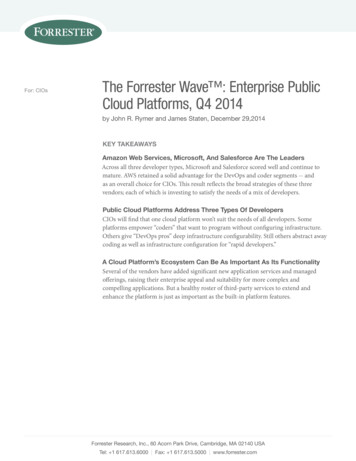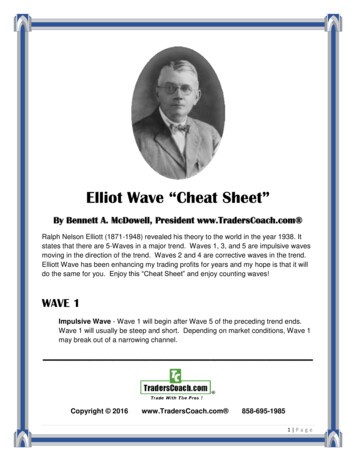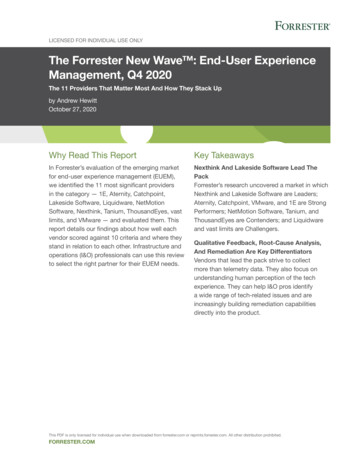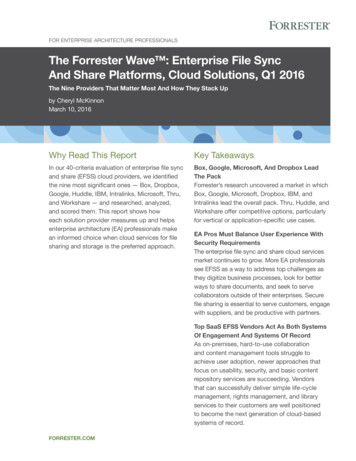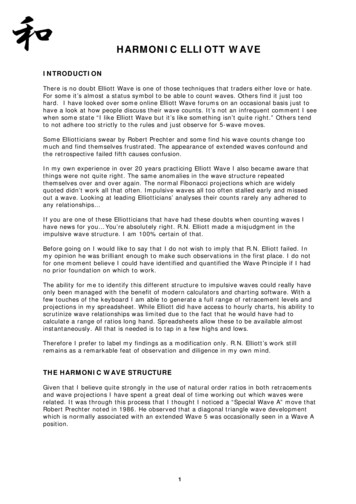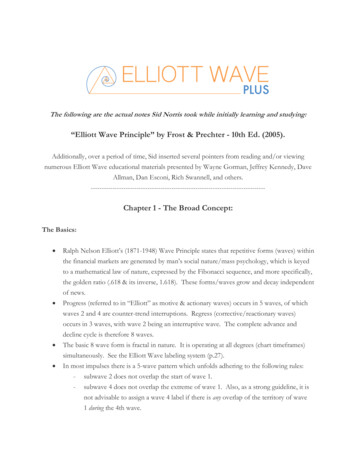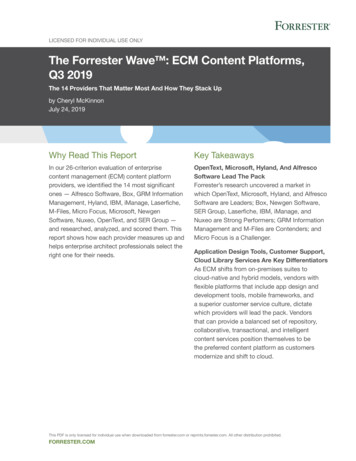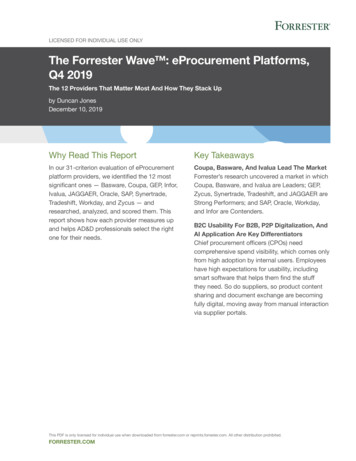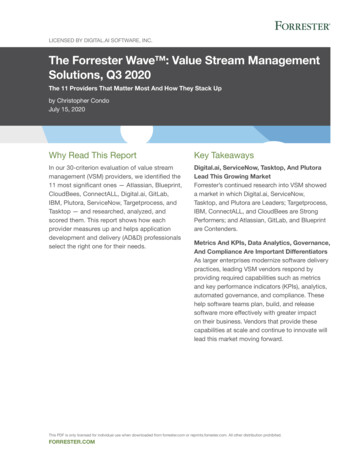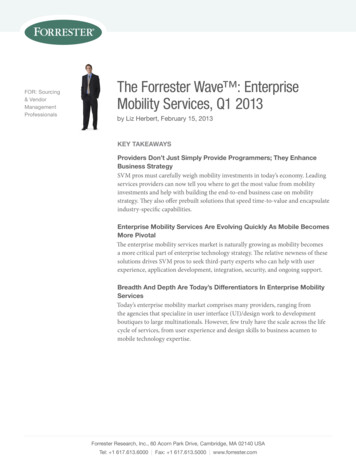
Transcription
For: Sourcing& VendorManagementProfessionalsThe Forrester Wave : EnterpriseMobility Services, Q1 2013by liz Herbert, February 15, 2013key TakeaWaysproviders don’t Just simply provide programmers; They enhanceBusiness strategySVM pros must carefully weigh mobility investments in today’s economy. Leadingservices providers can now tell you where to get the most value from mobilityinvestments and help with building the end-to-end business case on mobilitystrategy. They also offer prebuilt solutions that speed time-to-value and encapsulateindustry-specific capabilities.enterprise Mobility services are evolving Quickly as Mobile BecomesMore pivotalThe enterprise mobility services market is naturally growing as mobility becomesa more critical part of enterprise technology strategy. The relative newness of thesesolutions drives SVM pros to seek third-party experts who can help with userexperience, application development, integration, security, and ongoing support.Breadth and depth are Today’s differentiators in enterprise MobilityservicesToday’s enterprise mobility market comprises many providers, ranging fromthe agencies that specialize in user interface (UI)/design work to developmentboutiques to large multinationals. However, few truly have the scale across the lifecycle of services, from user experience and design skills to business acumen tomobile technology expertise.Forrester research, inc., 60 acorn Park drive, cambridge, Ma 02140 uSatel: 1 617.613.6000 Fax: 1 617.613.5000 www.forrester.com
For Sourcing & Vendor Management ProfessionalsFebruary 15, 2013The Forrester Wave : Enterprise MobilityServices, Q1 2013Analysis Of 13 Global Leaders’ Capabilities And How They Stack Upby Liz Herbertwith Jeffrey S. Hammond, Chris Andrews, and Ben JenningsWhy Read This ReportEnterprise mobility is booming; organizations must connect with employees, customers, and partners innew ways and across new devices and applications. But many organizations don’t know how to move tothis new mobile world, and they can’t afford costly mistakes like a failed investment, which could damagetheir reputation. These technologists need help with their enterprise mobility strategy, and they’re turningto mobility services providers to design, develop, and support their mobile applications. In our 15-criteriaemerging markets Forrester Wave evaluation of enterprise mobility services providers, we identified the13 leading global services providers delivering enterprise mobility services — Accenture, AT&T, Atos, CGI,Cognizant, CSC, Deloitte, HCL, IBM, Infosys, PwC, TCS, and Wipro — in the category and researched,analyzed, and scored them. This report details our findings about how well each provider fulfills ourcriteria and where they stand in relation to each other to help mobility services buyers select the rightpartner for their needs.Table Of ContentsNotes & Resources2 The Mobile Explosion Has Changed BuyerNeedsForrester conducted provider evaluations inNovember 2012 and interviewed 13 providerand user companies: Accenture, AT&T, Atos,CGI, Cognizant, CSC, Deloitte, HCL, IBM,Infosys, PwC, TCS, and Wipro.4 A Crowded Mobility Services Market GivesBuyers Many Strong Options7 Enterprise Mobility Services EvaluationOverview9 Many Leaders, But Strengths Vary By Geo,Industry, And Service Line13 Provider Profiles17 Supplemental MaterialRelated Research DocumentsThe State Of Mobile Technology AdoptionOctober 3, 2012Best Practices: How To Implement A MobileProduct And Service Road MapJuly 19, 2012Executing End-To-End Mobile ServicesMay 10, 2012 2013, Forrester Research, Inc. All rights reserved. Unauthorized reproduction is strictly prohibited. Information is based on best availableresources. Opinions reflect judgment at the time and are subject to change. Forrester , Technographics , Forrester Wave, RoleView, TechRadar,and Total Economic Impact are trademarks of Forrester Research, Inc. All other trademarks are the property of their respective companies. Topurchase reprints of this document, please email clientsupport@forrester.com. For additional information, go to www.forrester.com.
For Sourcing & Vendor Management Professionals2The Forrester Wave : Enterprise Mobility Services, Q1 2013the mobile explosion has changed buyer needsThe statistics are astounding. The number of mobile devices now outpaces humans on this planet,as it is estimated that there were 7.3 billion devices in the world in 2012 (compared with just under7 billion people, according to the World Bank).1 Mobility is driving significant changes in theway organizations source technology and technology services. Seventy-one percent of IT servicesexecutives say that increased employee use of apps on tablets and smartphones also increasesservices spend (in business and in IT), creates more software-as-a-service (SaaS) deploymenton mobile devices, and drives them to hire more third-party services firms across multiple areas,including specialized development and security (see Figure 1 and see Figure 2).Figure 1 Mobile Adoption Is High On The List Of Factors Affecting Services Spend“How much of an impact do you believe the following changes and initiatives will have on yourfirm’s IT services spending over the next 12 months?”Moderate impactThe need to innovate and grow our businessSignificant impact35%The need to lower our IT operational costs37%Senior business management’s conservativeapproach to spending on large projects34%Consolidation of business units or streamliningoperations34%The increased reliance on predictive analytics tohelp inform better and timelier business decisionsWe are bringing in new, smaller, more innovativevendors to help us implement new technologies42%41%The increasing use of smartphones and tablets,as well as the apps on themThe increased use of software-, infrastructure-, orbusiness-process-as-a-service offeringsBusiness executives taking a more active role inthe provisioning and decision-making fortechnology and IT servicesThe need to grow/expand the business in newgeographies and developing %Base: 1,058 international IT executives and technology decision-makersSource: Forrsights Services Survey, Q2 201287581 2013, Forrester Research, Inc. Reproduction ProhibitedSource: Forrester Research, Inc.February 15, 2013
For Sourcing & Vendor Management Professionals3The Forrester Wave : Enterprise Mobility Services, Q1 2013Figure 2 Mobility Drives Services Spend On SaaS, Developers, And Security“How will (or has) the increasing use of smartphones and tablets and the use of apps on themaffect(ed) your firm’s IT services spending over the next 12 months?”Increase our services budget in IT to pay forthese new services47%Deploy more software-as-a-service applicationson the devices40%Hire a third party to help us develop applicationsfor the devices34%Choose new suppliers with specialized mobile skills30%Increase our services budget in business units topay for these new services30%Hire a third party to help us define how we will handlesecurity for the devices and the associated apps27%Reduce IT services spending in other areas to pay forthese new services20%Hire a third party to help us manage the devicesDeploy more public infrastructure-as-a-serviceofferings to help manage the devicesHire a third party to help us rationalize/modernize ourmiddleware/legacy systems to fully support apps onsmartphones and tabletsHire a third party to help implement a corporate appstore to manage the apps and devices19%16%14%11%Base: 487 IT services decision-makers who believe that the increasing use of smartphones andtablets will have a moderate or significant impact on their firm’s IT spending over the next 12 monthsSource: Forrsights Services Survey, Q2 201287581Source: Forrester Research, Inc.Delivery Of Mobile Services Must Be FastThe services game is changing now that mobile services are a relevant part of the service delivery mix.Demand for new mobility services is rising rapidly even while the underlying mobile platformsevolve at top speed. Mobility services consultants must keep up with new devices, new platforms, andevolving buyer demands. These services teams struggle with many of the same problems traditionalapplications consultants face: an explosion of data, infrastructure moving to the cloud, and a need forapplications to be social. They also struggle with new concerns, such as the need for mobile solutionsto run on a shifting panoply of multiple devices and mobile OSes. The users of mobility solutionshave little tolerance for a service interruption, an error message, or slow performance. These pressingneeds are driving new technology solutions and business models into the mix: 2013, Forrester Research, Inc. Reproduction ProhibitedFebruary 15, 2013
For Sourcing & Vendor Management Professionals4The Forrester Wave : Enterprise Mobility Services, Q1 2013 Ready-to-go mobile solutions — horizontal and industry-specific. Leading providers ofenterprise mobility services are changing their game with ready-to-go platforms and app stores.More than just reusable assets, these are full-blown solutions — both cross-industry or readyfor specific industries. Sample solutions include mobile wallets (from multiple providers such asInfosys and Atos), mobile point-of-sale solutions (such as TCS’s solution), connected vehicles(such as the one from Atos), and app store solutions (such as Infosys Flypp and CognizantEnterprise App Hub). Reusable assets and centers of excellence that speed up projects and drive down costs. Buyersbudget for enterprise mobility projects that cost hundreds of thousands of dollars (on average)and take weeks or months, so providers must be able to get quality solutions to their clientsquickly, iteratively, and cost-effectively. This means that the use of tools and prebuilt IP is amust, and not just a “nice to have” in the enterprise mobility space. Solutions like the AccentureMobile Applications Test Lab and Wipro MobileTrust Framework are designed to speed up thesecurity assessment and testing portions of mobility projects. Flexible, outcome-driven contracts. Mobility services buyers must prepare for the unknown:new technologies, rapidly changing business requirements, and uncharted business models.This means that they need partners who can adjust to changing project requirements throughflexible resourcing requirements, changing directions, and midproject shifts in thinking. Theyneed providers who can balance innovation with project management. Contracts in themobility space are rarely time-and-materials-based (versus more traditional applications areas);outcome-based, revenue share, and pay-as-you-go models are common.a crowded mobility Services Market Gives Buyers many strongoptionsThe market for mobility services gives buyers literally hundreds of options to consider, fromspecialist design firms to technology boutiques to large multinationals and telcos. Because of therapid shift in enterprise computing to mobile as the new paradigm, every major services providerhas made mobility a substantial focus area for investment, with growth rates in the double and tripledigits. Providers are rushing to scale their enterprise mobility practices and differentiate on areassuch as UI design, innovation, breadth of skills, and depth of resource pool. The market is changingat a fast pace — with providers trying to leapfrog the competition through more transformationalengagements and large-scale, enterprisewide mobility deals. Significant factors to consider whenselecting a provider include (see Figure 3): User experience and design capability. Special device factors — touch, small screens, NearField Communications (NFC), camera features — mean new opportunities and new challengesfor application design. Leading organizations in this domain focus on hiring talent with a mix ofcreative- and design-oriented backgrounds and foster a strong culture of user experience. Talent 2013, Forrester Research, Inc. Reproduction ProhibitedFebruary 15, 2013
For Sourcing & Vendor Management Professionals5The Forrester Wave : Enterprise Mobility Services, Q1 2013and hiring profiles may come from gaming companies, consumer-focused businesses, andindividuals with formal training in design and human factors. Process and industry expertise. Clients want to go beyond simply putting applications onmobile devices. They need to understand how mobile is driving business transformation andcreating new opportunities for customer engagement. For example, financial services firms needto explore how mobile banking allows them to target new consumers (such as those who maynot otherwise have access to a bank). Retailers want to see how mobility can breed customerloyalty or new ways of pricing and targeting location-specific offers. This level of insight intoprocess change requires more than just user interface and technology prowess; clients need helpwith business process consulting, change management, and deep understanding of businesstransformation matters specific to their industry. Development and technical resources. Proliferation of mobile devices, operating systems, andplatform-specific development languages means that clients lack the in-house developmentskills necessary to carry out their vision for mobility, and so they turn to third-party resourcesfor help. They seek consultants with breadth and depth across Android, iOS, Windows Phoneand Windows RT, BlackBerry, and Samsung bada. They seek mobile development expertiseacross SAP (Syclo and Sybase), Oracle, Kony, Antenna Software, Appcelerator, Sencha, andothers. And they need programming skills across Objective-C, Java, C#, HTML5/CSS3/Javascript, and others. Development expertise is still growing in the mobile services market —and is a moving target. End-to-end services capabilities. Mobility services buyers often start small with pilot projectsor divisional needs. But clients increasingly find that they have broad long-term needs thatspan the full gamut of IT services: service inceptions to design to implementation through todeployment. With mobile services becoming a growing part of firms’ technology footprint andincreasingly connected to larger IT strategy, clients often need more than a point solution, sothey must consider the end-to-end breadth of their mobility services’ needs — including longterm support and enhancements. 2013, Forrester Research, Inc. Reproduction ProhibitedFebruary 15, 2013
For Sourcing & Vendor Management Professionals6The Forrester Wave : Enterprise Mobility Services, Q1 2013Figure 3 Buyers Struggle To Find The Right Skills In A Single ProviderSpecialistsDevelopmentand technicalresourcesUser experienceand usinessand processconsultingIT servicesGeneralist87581Source: Forrester Research, Inc.Buyers Must Sift Through Hundreds Of Options In This Fast-Moving, Crowded MarketWhen we evaluated the mobility services of the largest technology services providers, we foundmany leaders. While these firms differ in their specific strengths (by service line, by industry, bydomain, and by geography), clients have multiple top-tier options to consider. Clients seeking topartner with a mobility services provider have a wide range of options to consider, from specialistsand boutiques to creative/design agencies to outsourcers to telcos. Larger firms (the former BigFour multinational consultancies, tier 1 India-based consultancies and outsourcers, and telcos)have jumped ahead in terms of scale, breadth, and depth. These firms have deep pockets to investin talent, R&D, and acquisitions to compete in the enterprise mobility services. However, manyclients still prefer smaller, more specialized firms, who they see as more nimble, flexible, and pricecompetitive. The types of firms that have skills in this market include: Design firms and agencies, which focus on user experience. Organizations that seek highlycreative, innovative mobile projects — especially for consumer-facing apps— should consideragencies and design-oriented consultancies. These firms pride themselves on hiring highlyskilled, creative developers and the best design talent they can find. In reality, the lines betweencreative developer and technologist are not neatly drawn, and many creative developers havesome technology expertise as well (or live within a larger technology shop, such as IBM’s designagency or Deloitte’s Übermind). Examples include Chaotic Moon, Cynergy Systems, DoubleEncore, Effective-UI, Isobar, Mutual Mobile, Roundarch, Sapient, and Siteworx. 2013, Forrester Research, Inc. Reproduction ProhibitedFebruary 15, 2013
For Sourcing & Vendor Management Professionals7The Forrester Wave : Enterprise Mobility Services, Q1 2013 Technology boutiques, which excel at mobile development and focus on flexibility and value.Smaller mobility practices provide more nimble, flexible, and lower-cost alternatives to largetechnology consultancies. With mobility moving so quickly and taking a high priority at manyorganizations, mobility services buyers may want to consider a smaller shop where they canhave attention from top executives and more flexibility in pricing and delivery models versuslarger peers who will be more tied to corporate policy. Some leading examples of boutiquemobility providers or technology boutiques with strong mobility capabilities include Cantina,CapTech Ventures, Ci&T, ThoughtWorks, UST Global, and Virtusa. Global multinationals and outsourcers, which provide breadth and depth of mobility services.Global technology consultancies have deep pockets to invest in building mobility resources(organically and inorganically), global resources, and a broad range of technology expertise. Theyare a strong choice for many larger-scale mobility initiatives, especially ones that require broadertechnology expertise that smaller firms lack, such as mobile initiatives that touch SAP or heavyanalytics initiatives. The Forrester Wave analysis in this report primarily concentrates on aselection from this group. Additional providers in this group that are not in the Forrester Wave buthave strong mobility capabilities include Dell, Fujitsu, HP, and Tech Mahindra. Telcos, which provide highly managed services and extensive network integration.Telecommunications providers offer the broadest range of mobility solutions, especially incategories including device and network management. Leading telecommunications optionsfor mobile solutions also have a strong heritage in enterprise applications and consumerapplications so that they can deliver an end-to-end mobility solution to customers. Examplesinclude AT&T, BT, T-Systems, and Verizon.enterprise mobility services Evaluation OverviewTo assess the state of the enterprise mobility services market and see how the providers stack upagainst each other, Forrester evaluated the strengths and weaknesses of top global enterprisemobility services providers.Comparing Global Services Providers’ Enterprise Mobility CapabilitiesAfter examining past research, user need assessments, and provider and expert interviews, wedeveloped a detailed set of evaluation criteria. We evaluated providers against 15 criteria, which wegrouped into three high-level buckets: Current offering. To assess the current offerings, we considered five criteria. First, we looked atuser experience and usability capabilities. Second, we analyzed process and advisory capabilitiesto understand how providers can help clients navigate the business goals, industry, and domainneeds that surround their mobility projects. Third, we looked at the strength of the technology 2013, Forrester Research, Inc. Reproduction ProhibitedFebruary 15, 2013
For Sourcing & Vendor Management Professionals8The Forrester Wave : Enterprise Mobility Services, Q1 2013practice — in terms of numbers and breadth and depth of tools, industry resources, IP, andtechnology prowess. Fourth, we evaluated the end-to-end capabilities of the provider’s abilityto deliver mobility services from strategy to implementation to testing and QA through tohosting and cloud options and ongoing support. And finally, we considered the overall strengthof the provider in enterprise applications and how the mobility practice ties into other relevantpractices. To score well on this item, providers had to demonstrate not only the existence ofstrong practices across enterprise applications areas but also the relevance of those practices inreal-world client situations where they deployed mobility services. Strategy. To analyze providers’ strategies for enterprise mobility services, we evaluated R&D areasand metrics such as dollars of investment, dedicated centers of excellence, and patents. Weinterviewed providers to understand their go-to-market strategy, how they differentiate, and howthey tailor marketing, sales, and solutions for well-defined target markets. We also considered howfocused the provider is on mobility services. Finally, we looked at pricing and business models. Market presence. For market presence, we rated mobility services revenues, mobility servicescustomers, mobility revenue growth, mobility employees, and overall financials for the corporation.This shows a mix of both the size of the mobility practice and the health of the overall provider.Analysis Includes Global Providers With Enterprise Mobility Capability And ScaleForrester included 13 providers in the assessment: Accenture, AT&T, Atos, CGI, Cognizant, CSC,Deloitte, HCL, IBM, Infosys, PwC, TCS, and Wipro. Each of these providers has (see Figure 4): A global enterprise mobility practice with deep industry and process knowledge. This reportfocuses on providers with worldwide capabilities across multiple industry sectors that havethe capability to provide industry and process knowledge in the context of mobility. We alsonarrowed in on those with a significant focus on enterprise (versus consumer and versus smalland medium-size business [SMB]) mobility. Size and scale of enterprise mobility services practice. Providers that qualified for this reportgenerate 40 million or more in annual revenue from enterprise mobility services. They eachhave more than 300 employees dedicated to enterprise mobility services; most have many, manymore who touch mobility in some way, shape, or form. End-to-end strength that spans design work, process consulting, development, and support.The providers that made the cutoff for inclusion all have breadth of services capabilities. Eachone is strong in design work, process consulting, technical development and integrationwork, and ongoing support. We did not include providers that are strong in only a subset ofthese areas, such as design specialists or developer shops that do not have design and processconsulting capability. 2013, Forrester Research, Inc. Reproduction ProhibitedFebruary 15, 2013
For Sourcing & Vendor Management Professionals9The Forrester Wave : Enterprise Mobility Services, Q1 2013Figure 4 Evaluated Providers: Provider Information And Selection CriteriaVendorMobile services areaAccenturemCommerce, M2M, mobile healthcareAT&TM2M, mobile application development, mobile device managementAtosEnterprise mobility, automotive — connected vehicles, MyCity — mobile services for citiesCGIApplication development, mobile workforce/asset management, mobile securityCognizantBFS — wealth management, life sciences — sales force, tech — independent software vendorCSCDevice and data management, application design and development, mobile consultingDeloitteConsumer-facing/commerce, field service enablement, back-office/enterprise enablementHCLMobile consulting, mobile testing, managed mobilityIBMBanking, healthcare, distributionInfosysMobile as a channel for customer engagement, mobile-based sales force automationapplications, mobile-based enterprise workforce productivity applicationsPwCMobile user engagement, mobile development, mobile security, mobile strategyTCSMobile application development and maintenance, mobile application testing, mobility strategydevelopmentWiproMobility advisory services, user experience, mobility managed services, mobile testingSelection criteria1. Annual mobility services revenues of more than 40 million2. More than 300 mobility services employees3. Global capabilities in mobility services across a wide range of industriesSource: Forrester Research, Inc.many leaders, but strengths vary by geo, industry, and service lineOur evaluation of 13 leading options in the enterprise mobility market shows that many of thelarge global consultancies have invested rapidly to offer leading enterprise mobility solutions toclients. Nearly all of these firms have identified mobility as a top strategic initiative, as it has becomea critical element of their client work across multiple domains — from ERP implementations tocloud solutions to customer experience transformation projects. This means that these firms arerapidly scaling capabilities across areas required for success in enterprise mobility services, such as 2013, Forrester Research, Inc. Reproduction ProhibitedFebruary 15, 2013
For Sourcing & Vendor Management Professionals10The Forrester Wave : Enterprise Mobility Services, Q1 2013mobile design, mobility strategy, mobile application development, testing, security, and support. Keydifferences across these leaders are most pronounced at an industry-specific, geographic, or process(i.e., HR or CRM) level. The evaluation uncovered a market in which (see Figure 5): IBM, Accenture, and Infosys lead the pack. Breadth and depth of capabilities today — anddeep investments into future areas — make IBM, Infosys, and Accenture leaders in today’senterprise mobility services Forrester Wave. These providers have strong capabilities across userexperience, process consulting, development, and end-to-end capacity to support clients acrossa broad spectrum of mobility needs. They also have heavy investments in prebuilt IP to jumpstart mobility projects. And they each have broad practices in enterprise applications, social,cloud, analytics, and other relevant areas that take mobility from a standalone discipline to atransformational investment for clients. Wipro, Deloitte, Cognizant, TCS, HCL, and PwC have established strong, growing practices.This next cluster of providers offers breadth and depth of enterprise mobility services — andstrong growing practices. While this group has capabilities across the full spectrum of skills, fromuser experience to process consulting to technical development to support, some skew moretoward process consulting (PwC and Deloitte), whereas others have a heavier mix of technicalskills spanning development areas and testing (Wipro, Cognizant, TCS, and HCL). They havebuilt some productized IP and solutions and started to pioneer new and innovative pricingmodels — but not to the same degree as some of their peers who are ahead in these areas. AT&T, Atos, CGI, and CSC are strong choices for specific buyer needs. AT&T, Atos, CGI, andCSC cater to specific needs, such as vertical, company size, type of service, or geography. Atosand CGI skew toward European-centric deployments and have a heavier mix of experience andofferings for certain industry verticals. AT&T has broad and horizontal offerings but capitalizesmost on its own client base where it has added benefits such as owning the device managementand the network. CSC is strongest in deals that align with its broader portfolio, such asconverged cloud and virtualization, and in industries such as transportation, manufacturing,financial services, and healthcare.This evaluation of the enterprise mobility market is intended to be a starting point only. Weencourage clients to view detailed product evaluations and adapt criteria weightings to fit theirindividual needs through the Forrester Wave Excel-based provider comparison tool. 2013, Forrester Research, Inc. Reproduction ProhibitedFebruary 15, 2013
For Sourcing & Vendor Management Professionals11The Forrester Wave : Enterprise Mobility Services, Q1 2013Figure 5 Forrester Wave : Enterprise Mobility Services, Q1 LWiproCGIAtosAT&TGo online to downloadthe Forrester Wave toolfor more detailed productevaluations, featurecomparisons, andcustomizable rankings.CurrentofferingMarket presenceFull vendor participationWeakWeakStrategyStrongSource: Forrester Research, Inc. 2013, Forrester Research, Inc. Reproduction ProhibitedFebruary 15, 2013
For Sourcing & Vendor Management Professionals12The Forrester Wave : Enterprise Mobility Services, Q1 izantCSCDeloitteHCLFigure 5 Forrester Wave : Enterprise Mobility Services, Q1 ’13 (Cont.)CURRENT OFFERINGCreative design and user experienceProcess consulting and advisory servicesBreadth of mobile technology skillsMobile technology competenciesLink to other technology get marketPricing 5.004.005.004.00MARKET PRESENCEInstalled baseMobile services revenueMobile services revenue growthEmployeesTotal company 03.004.001.00All scores are based on a scale of 0 (weak) to 5 (strong).Source: Forrester Research, Inc. 2013, Forrester Research, Inc. Repro
to mobility services providers to design, develop, and support their mobile applications. In our 15-criteria emerging markets Forrester Wave evaluation of enterprise mobility services providers, we identified the 13 leading global services providers delivering enterprise mobility services — Accenture, AT&T, Atos, CGI,


